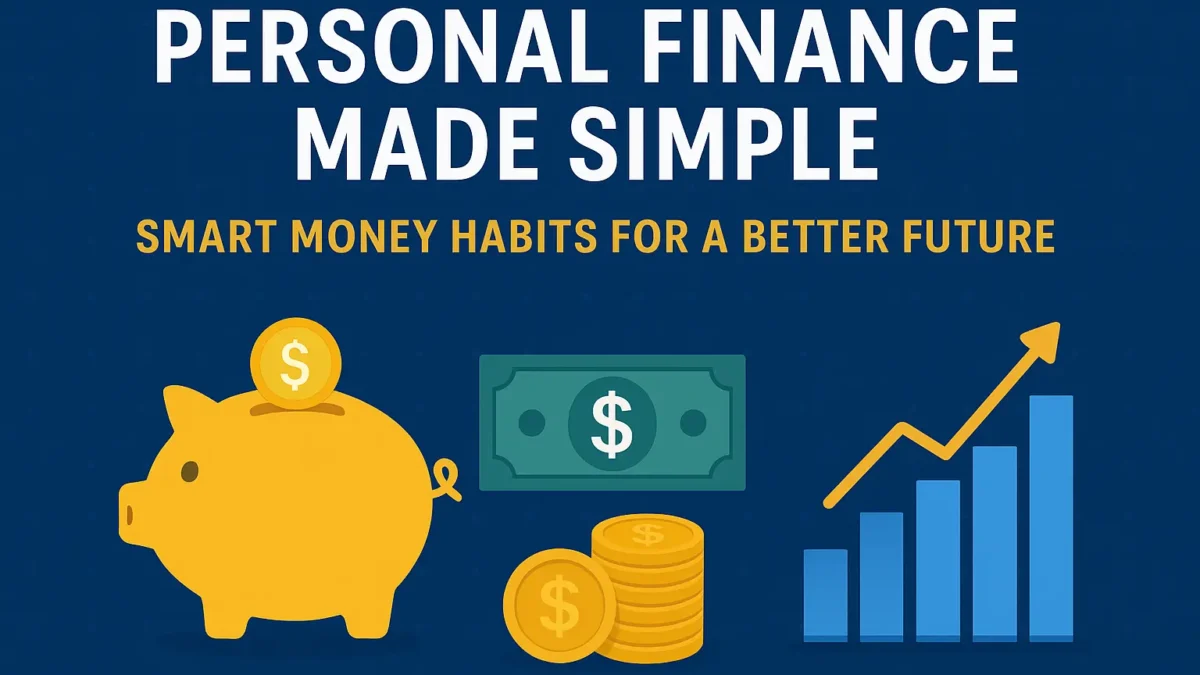
Personal Finance Made Simple: Smart Money Habits for a Better Future
In today’s fast-paced world, money management is not just about earning—it’s about managing, saving, and investing it wisely. Whether you’re a student, a young professional, or someone planning for retirement, personal finance plays a critical role in shaping your financial future.
The good news? You don’t need to be a financial expert to take control of your money. With a few smart habits and consistent planning, you can build a strong foundation for financial stability and freedom.
Let’s break down personal finance in simple terms and explore the best money habits that can lead you toward a better, stress-free financial future.
🧾 What is Personal Finance?
Personal Finance refers to managing your money effectively to achieve short-term and long-term financial goals. It includes budgeting, saving, investing, debt management, insurance, and retirement planning.
In simple words, personal finance = how you earn, spend, save, and invest your money.
When you manage your personal finances properly, you can:
Avoid unnecessary debt
Build savings for emergencies
Plan for retirement
Invest for future growth
Achieve financial independence
Why Personal Finance Matters in 2025 and Beyond
In a world of rising inflation, uncertain job markets, and rapidly changing technology, financial awareness has become essential.
The earlier you start managing your finances, the better control you’ll have over your life choices.
Here’s why personal finance is so important:
Helps you achieve financial goals like buying a home or car
Reduces financial stress and improves peace of mind
Helps your money grow through smart investments
Prepares you for emergencies and unexpected expenses
Builds long-term wealth and financial security
Step 1: Build a Solid Budget
Budgeting is the foundation of personal finance.
A budget helps you track where your money is going and ensures you spend less than you earn.
🔹 How to Create a Simple Budget:
List your income sources: Salary, side hustle, rental income, etc.
Track monthly expenses: Rent, utilities, food, transport, entertainment.
Categorize your spending: Needs, Wants, and Savings.
Follow the 50/30/20 Rule:
50% on needs (bills, rent, food)
30% on wants (movies, dining out)
20% on savings/investments
✅ Pro Tip:
Use free apps like Mint, YNAB (You Need A Budget), or PocketGuard to automate your budgeting and track expenses effortlessly.
Step 2: Save Before You Spend
One of the smartest money habits is “Pay Yourself First.”
Before spending your income on bills or lifestyle expenses, transfer a fixed amount into your savings account.
This habit ensures you’re saving consistently rather than saving whatever’s left at the end of the month.
🔸 Types of Savings:
Emergency Fund: Save at least 3–6 months’ worth of living expenses for emergencies.
Short-Term Goals: Travel, gadgets, or home decor.
Long-Term Goals: Buying a house, retirement, children’s education.
✅ Pro Tip:
Set up an automatic transfer from your main account to your savings every month. This way, you won’t forget or skip saving.
Step 3: Control Your Debt Wisely
Debt can be useful (like home loans) or harmful (like credit card debt). The key is to use debt smartly and avoid unnecessary borrowing.
🔹 Smart Debt Habits:
Always pay credit card bills in full every month.
Avoid taking loans for depreciating assets (like electronics or luxury items).
Refinance high-interest loans if possible.
Maintain a good credit score (700+) by paying on time.
✅ Pro Tip:
Follow the “Snowball Method” to repay debt — pay off small debts first to gain momentum, then tackle bigger ones.
Step 4: Start Investing Early
Saving money is great, but investing is what makes your money grow.
Inflation reduces the value of idle cash, so investing helps you stay ahead and build wealth.
🔸 Popular Investment Options:
Mutual Funds – Ideal for beginners; provides diversification.
Stocks – Higher risk, higher return for long-term investors.
Fixed Deposits (FDs) – Safe but low returns; good for short-term goals.
Public Provident Fund (PPF) – Tax-free and great for retirement.
National Pension System (NPS) – Long-term retirement savings plan.
Real Estate – Tangible asset but needs large capital.
✅ Pro Tip:
Start small with SIPs (Systematic Investment Plans) — even ₹500/month can grow significantly over time thanks to compounding.
Step 5: Protect Yourself with Insurance
Even the best financial plan can fall apart due to unexpected health issues, accidents, or loss of income.
That’s why insurance is a crucial part of personal finance.
🔹 Types of Insurance You Should Have:
Health Insurance: Covers hospital expenses for you and your family.
Life Insurance (Term Plan): Protects your family financially if something happens to you.
Vehicle Insurance: Mandatory for car or bike owners.
Home Insurance: Protects your house and assets from damage or theft.
✅ Pro Tip:
Always choose term insurance over traditional plans. It’s cheaper and offers higher coverage.
Step 6: Build Multiple Income Streams
Relying on a single source of income (like your job) is risky.
Creating multiple income streams ensures financial security even during tough times.
🔸 Ideas for Additional Income:
Freelancing (writing, design, marketing)
Blogging or YouTube channel
Investing in dividend-paying stocks or mutual funds
Selling online courses or e-books
Real estate or rental income
✅ Pro Tip:
Focus on building passive income — money that keeps coming in with little to no effort, like dividends or royalties.
Step 7: Educate Yourself Financially
Financial literacy is the real secret to long-term wealth. The more you learn, the better decisions you make.
🔹 What to Learn:
Basics of budgeting and investments
Understanding interest rates and taxes
How to read financial statements
Importance of risk management
🔹 Recommended Books:
Rich Dad Poor Dad – Robert Kiyosaki
The Psychology of Money – Morgan Housel
Your Money or Your Life – Vicki Robin
Atomic Habits – James Clear (for habit building)
✅ Pro Tip:
Follow trusted YouTube finance channels or podcasts to stay updated on new financial trends.
Step 8: Plan for Retirement Early
Many people think retirement planning is for the future — but the earlier you start, the more comfortable your retirement will be.
🔹 Retirement Planning Steps:
Estimate how much you’ll need post-retirement.
Start investing in long-term plans like PPF, NPS, or index funds.
Diversify investments to balance risk.
Reinvest dividends to maximize compounding.
✅ Pro Tip:
The power of compound interest is magical — start investing early, and let time do the work for you!
Step 9: Avoid Lifestyle Inflation
As your income grows, it’s natural to spend more — but uncontrolled spending can destroy savings.
This is called Lifestyle Inflation — when your expenses rise as your income rises.
🔹 Smart Tips:
Maintain your original spending habits.
Save or invest your salary increments.
Focus on value-based purchases, not luxury.
✅ Pro Tip:
For every raise you get, increase your savings percentage, not just your lifestyle.
Step 10: Review and Adjust Regularly
Your financial plan should evolve as your goals and income change.
🔹 Financial Checkpoints:
Review your budget every 3 months.
Rebalance your investment portfolio annually.
Reassess your insurance coverage after major life events (marriage, child, etc.).
✅ Pro Tip:
Treat your finances like your health — regular checkups keep them in shape.
Summary: Smart Money Habits to Follow Daily
| Habit | Description |
|---|---|
| Pay Yourself First | Save before spending |
| Track Expenses | Know where every rupee goes |
| Avoid Unnecessary Debt | Borrow only for productive use |
| Invest Consistently | Build wealth through compounding |
| Stay Insured | Protect your financial future |
| Keep Learning | Improve financial literacy |
| Start Early | The earlier you start, the better |
Final Thoughts: Build a Better Financial Future
Personal finance is not about being rich overnight. It’s about developing discipline, patience, and smart habits that lead to long-term financial independence.
You don’t need a high-paying job or a finance degree — you just need to start today.
Remember these golden rules:
Spend less than you earn.
Save and invest the difference.
Keep learning and adapting.
With consistency and smart money management, you’ll be amazed at how quickly your financial life transforms.
So, are you ready to take control of your money and secure your future?
Start today — your better financial tomorrow depends on the actions you take right now.
